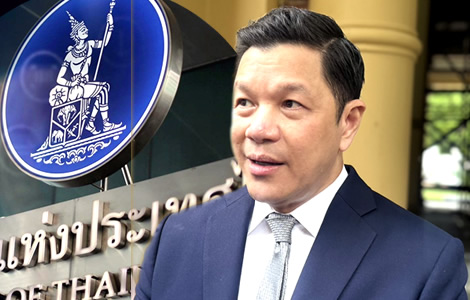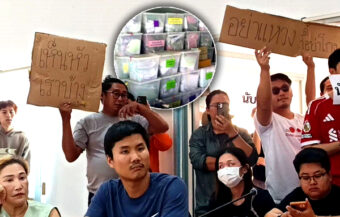Bank of Thailand Governor Vitai Ratanakorn takes charge, vowing stability and independence, while new Finance Minister Ekniti Nitithanpraphat tackles weak GDP, a rising baht and economic malaise as the country navigates political turmoil.
New Bank of Thailand Governor Vitai Ratanakorn took the reins on Wednesday and wasted no time staking out the central bank’s independence. He also nailed down its core mission in one word: stability. Handpicked by the previous government for his liberal, reform-minded views, he now finds himself navigating a volatile political landscape with a brand-new administration. Alongside him, newly appointed Finance Minister Ekniti Nitithanpraphat is racing to get a grip on the country’s economic mess. Thailand is clinging to hopes of just 1% growth in the final quarter of 2025, but the broader picture looks bleak. Full-year GDP is now projected at just 1.8%—well short of the earlier 2.3% forecast and trailing far behind regional competitors.

Vitai Ratanakorn officially assumed the role of Governor of the Bank of Thailand (BoT) on October 1, 2025. He became the 25th person to lead the central bank since its founding. He arrived at the BoT headquarters at 8:36 a.m., beginning his term with a ceremony paying respect to the institution’s sacred shrines.
From the start, Vitai made his message clear. He stated that the BoT’s core mission is “stability” and macroeconomic resilience. Crucially, he stressed that the BoT must remain independent from politics to safeguard long-term policy credibility. “We must protect the bank’s integrity from political pressure,” he said. According to him, policy must be data-driven, not politically motivated.
This statement comes at a time of mounting economic challenges. Thailand is entering a period marked by sluggish growth, global uncertainty and rising currency pressure. Therefore, the BoT’s direction over the next 12 to 18 months could shape the country’s recovery.
Vitai steps in amid political turmoil and economic pressure to defend BoT independence and stability
Mr. Vitai was chosen by the outgoing government and former Minister of Finance, Pichai Chunhavajira. He was seen as a more liberal-minded central bank chief at a time when the Pheu Thai-led government was reported to be flirting with a quantitative easing approach, which would have weakened the baht.
Nonetheless, on Thursday, Governor Vitai sounded very much like his predecessor, Mr. Sethaput, when he said that stability was at the heart of the Bank of Thailand’s mission.
Joining Vitai in economic leadership is newly appointed Finance Minister Ekniti Nitithanpraphat. He is tasked with steering fiscal policy during the final months of 2025. Together, both men now form the core of Thailand’s economic decision-making team. Their coordination will be vital as the country navigates monetary and fiscal pressures.
Economic team races to lift 2025 growth as interest rate cuts and strong baht dominate short-term outlook
Mr. Ekniti is, of course, occupied with boosting GDP growth. On Thursday, he announced plans for economic stimulus to supercharge GDP growth in the final quarter to 1%. Despite a relatively good start to 2025, the projected growth rate for the year is still thought to be just 1.8%, well behind regional peers.
Meanwhile, interest rate policy remains under the spotlight. In August, under outgoing Governor Sethaput Suthiwartnarueput, the Monetary Policy Committee cut the base lending rate by 25 basis points. The rate now stands at 1.5%, its lowest in recent years. Analysts expect further cuts in the coming quarters. Many forecasts suggest rates could drop to 1% sometime in 2026.
However, external forces complicate the picture. In recent weeks, the US Federal Reserve has sent mixed signals on its rate direction. As a result, global markets remain volatile. Movements in the US dollar are affecting currencies across Southeast Asia, including the baht.
Notably, the Thai baht has risen sharply in recent months. It has appreciated by 6% against the US dollar in just half a year. As of October, it stands at ฿32.31 per US dollar. Although this reflects strong fundamentals, it also poses significant economic risks.
Rising baht strengthens finances but threatens exports and domestic economic recovery across sectors
A rising baht hurts Thai exports by making them more expensive. It also weighs on tourism by reducing visitors’ spending power. Despite this, the currency continues to strengthen, driven by resilient external finances and a surge in gold exports. Gold shipments, particularly to Cambodia, have unexpectedly jumped this year. This has improved the current account, adding pressure on the currency to rise.
Nevertheless, the appreciation contradicts Thailand’s underlying economic reality. Domestic growth remains uneven. Consumption is soft, and investment remains below pre-pandemic levels. Many sectors still struggle to recover.
Wages are stagnant, while household debt remains high. Therefore, the baht’s strength could widen the gap between financial markets and real economic performance.
For Vitai, this currency challenge is immediate and urgent. But it is far from the only concern. In his first public remarks, he acknowledged that Thailand faces both short-term volatility and long-term structural problems. These include low productivity, weak innovation, and an ageing population. “Urgent action is needed,” he said, “but lasting solutions must be structural.”
Vitai urges cooperation across government and BoT to tackle structural issues and safeguard stability
Importantly, he said that the BoT cannot address these issues alone. He called for full cooperation between the central bank, the Ministry of Finance, and all economic agencies. “Sustaining the economy requires shared responsibility,” Vitai stated. Coordination across fiscal, monetary, and regulatory frameworks is now essential.
At the same time, he reaffirmed the BoT’s commitment to its legal and policy mandates. “We will protect economic stability and financial discipline,” he said. He also promised that the BoT will stay focused on inflation, employment, and exchange rate stability.
Despite the challenges, Vitai’s appointment has generated cautious optimism. His reputation as a pragmatic and disciplined policymaker is well known. Previously, he served as President of the Government Savings Bank, where he pushed for digital modernisation and financial inclusion. Now, he must manage larger and more complex macroeconomic risks.
Moving forward, key decisions will revolve around inflation targeting, capital flows, and debt management. Additionally, financial system resilience will be a focus, particularly in light of rising global interest rate cycles. The BoT must also monitor credit conditions to avoid asset bubbles.
Thailand’s economic future faces global scrutiny as BoT navigates risks and sets a path into 2026
Thailand’s macroeconomic stability is not just a domestic concern. Investors, credit agencies, and trading partners are watching closely. A misstep could weaken confidence and trigger capital outflows. Therefore, the BoT’s next moves will be closely scrutinised at home and abroad.
In conclusion, Governor Vitai begins his term at a critical economic juncture. His insistence on independence and stability signals a firm stance.
Dark days ahead for the economy despite a 1.8% GDP gain with ominous warning signs on employment
Yet the road ahead remains difficult. Interest rate decisions, exchange rate dynamics, and deep structural weaknesses all demand urgent attention. For now, the central bank stands at the centre of Thailand’s economic balancing act—one that may define the country’s path into 2026 and beyond.
Join the Thai News forum, follow Thai Examiner on Facebook here
Receive all our stories as they come out on Telegram here
Follow Thai Examiner here
Further reading:
Dark days ahead for the economy despite a 1.8% GDP gain with ominous warning signs on employment
Concern for US tariff deal as new Thai government shows enthusiasm for stronger links with Beijing
Thailand’s once mighty tourism industry is failing but now faces further damage from overvalued baht
Rate cut anticipated as outgoing Bank of Thailand governor attends last Monetary Policy Committee


















